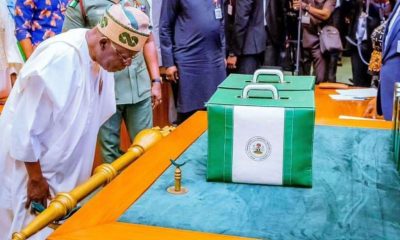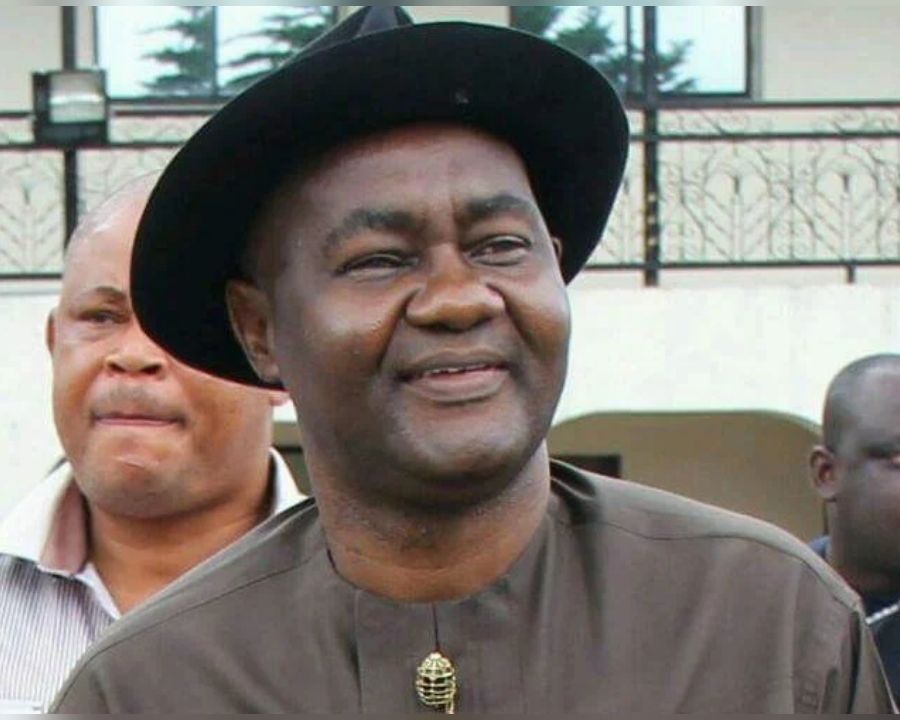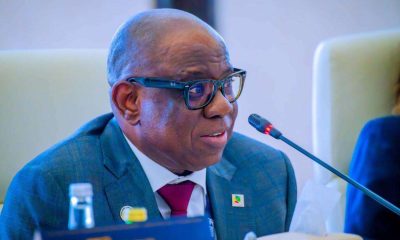Business
Controversy over President Tinubu’s mid term performance

“We are suffering,” – Nigerians
“No, Reform is working,” – Presidency, NASS
Thursday, May 29th, 2025, marks the second-year anniversary of the All Progressives Congress (APC) administration of President Bola Tinubu in power.
The former Lagos State governor, and national leader of the APC, had swept to power on May 29th, 2023, on the back of his ‘Renewed Hope’ mantra and promises of restoring Nigeria back on the path of economic prosperity.
Addressing an ecstatic crowd of supporters at the jam-packed Eagles Square venue of the inauguration ceremony, President Tinubu had boastfully declared: “We have endured hardship that would have other societies crumble.
“Our mission is to improve our ways of life in a manner that nurtures our humanity, encourages compassion towards one another, and duly rewards our collective efforts.”
It is now exactly two years since the president uttered those words after taking over the baton of power from his predecessor, former president Muhammadu Buhari, and it is time for assessment.
Different Verdicts
The nation has seen it all in the last 730 days of the administration. While many critics of the government scored the president low, pointing to the hardship in the land as a result of some of his ‘harsh’ policies, especially the removal of fuel subsidy and the unification of the multiple foreign exchange rates windows, the Presidency, governors, National Assembly, as well as economic and financial experts, argued that the bold reforms taken by the government, though had negative effects, have started yielding fruits.
However, Business Hallmark’s sectoral review of the socio-economic politics of the Tinubu’s administration and their effects on the entity showed that it’s been a bag of mixed fortunes.
Back from the brink; but not yet out of the woods
By the time former President Muhammadu Buhari handed over power to his successor, the nation’s economy was already in tatters. For instance, both local and foreign debts had ballooned out of control.
According to the Budget Office, while the Federal Government’s domestic debt rose from N8.84 trillion in December 2015 to N44.91 trillion in June 2023, external debt rose from $7.35billion in December 2015 to $37.2billion in June 2023. This excludes interventions by the Central Bank of Nigeria (CBN) amounting to N25 trillion. At the end of his term, Buhari moved Nigeria’s debt from N42 trillion to N77 trillion.
Under the previous administration, Nigeria’s debt-service-to-revenue ratio also grew from 29% to 96%; unemployment rose from 10.4% in 2015 to 33.4% in 2023; inflation grew from 9.0% in May 2015 to 22.4% in May 2023; GDP crashed from $493.03billion in 2015 to $362.81 billion in 2023 and per capita income crashed from $2,519 to $1,621 in 2023.
Coupled with the desperate economic policies introduced by the present administration immediately it came on board, which triggered seismic shocks, the already sapped economy looked destined for the abyss.
From 22.41% when President Bola Tinubu assumed power in May 2023, Nigeria’s headline inflation rate climbed to 27-year high of 34.80% in December 2024; forex rate plunged from N740 per dollar in 2023 to N1900 in June 2024 GDP fell from $362.81 billion to $188.27billion, and per capital income dropped from $1,621 to $877.
Slow, But Steady Economic Growth
However, to the credit of the administration, the nation’s economy looked to be witnessing a some turnaround from the precarious state it was in May 2023, as well as the shocks brought about by the 2023 policies of the Tinubu administration.
While the administration had largely failed to translate its promises of hope into reality by taking millions of Nigerians out of poverty, with much suffering and anguish in the land, Business Hallmark findings showed that there are signs of a shift to the path of growth.
A recent report by the World Bank said Nigeria’s economy recorded its fastest growth in about a decade in 2024, driven by a strong fourth quarter and an improved fiscal position.
According to the bank’s Lead Economist for Nigeria, Alex Sienaert, the nation’s economy grew by 4.6% year-on-year in the fourth quarter of 2024.
While he said the bank expects the economy to continue to expand in 2025 based on high-frequency business indicators, Sienaert projects that the economy will grow at 3.6% in 2025.
Slowing Inflation
While Nigeria continues to grapple with high inflation, the trend is gradually easing with headline inflation easing to 23.71 per cent in April 2025 from 24.23 per cent in March of 2025, representing a decrease of 0.52 per cent. This is based on the recalibrated inflation rate from 33.4 percent to 24 percent by the National Bureau of Statistics, NBS.
However, on a year-on-year basis, the headline inflation rate was 9.99 per cent lower than the 33.69 per cent rate recorded in April 2024.
This, the NBS said, shows that the headline inflation rate (year-on-year basis) decreased in April 2025 compared to the same month in the preceding month and year of April 2024, though with a different base year of November 2009 = 100.
A further breakdown of the NBS inflation figures showed that food inflation rate in April 2025 was 21.26 per cent on a year-on-year basis, about 19.27 per cent points lower compared to the 40.53 per cent.rate recorded in April 2024 before the recalibration.
UNEMPLOYMENT RATE
Another area of improvement is employment rate. Available data shows that Nigeria’s unemployment rate declined from 22.7 percent in the first quarter of 2024 to 20.5 percent in the second quarter of the year.
The report, says the NBS figures, represents findings from the Nigeria Labour Force Survey (NLFS) for the second quarter 2024.
However, some economic and population experts faulted the NBS’s unemployment figures, saying high population of idle and unemployed youths roaming the streets suggests otherwise.
OIL & GAS SECTOR: AN OASIS IN THE DESERT
The nation’s oil and gas sector, unarguably, is the best performing sector of the nation’s economy. The industry is at the hearth Nigeria’s economic rebirth.
According to the recently published Gross Domestic Product by the NBS, the oil and gas sector recorded sustained growth throughout 2024, recording an annual GDP expansion of 5.54%.
This, the bureau said, marks a significant rebound from the 2.22% contraction witnessed in 2023.
Further breakdown of the figures showed that the oil sector maintained positive growth across all four quarters of 2024. However, growth in Q4 2024 slowed to 1.48% due to base effects from the high 12.11% expansion recorded in Q4 2023.
Specifically, the oil refining sub-sector recorded a significant expansion in the fourth quarter of 2024, marking the first quarterly growth in five years.
According to the NBS’s GDP report, the oil refining sector posted a real GDP growth of 9.59% in Q4 2024.
Checks revealed that the last time the sub-sector recorded growth was in the last quarter of 2018 when it expanded by 33.6%. The sector witnessed a decline due to several factors, including the shutting down of the nation’s four public refineries, aging infrastructure and attacks on vital assets like oil/gas pipelines and terminals, exit of international oil companies, and the reliance of the nation on imported petroleum products.
Meanwhile, with the coming on board of the current administration, efforts at reviving the moribund oil and gas sector were intensified. Idle oil and gas fields abandoned by exiting oil majors were sold to indigenous firms, locals were brought in as security contractors to secure several kilometres of pipelines prone to attacks and sabotage.
Also the delayed Petroleum Industry Bill (PIB), which opened up the industry for more participation was passed into law and assented to by the president, while a barrage of executive orders introducing fiscal incentives for non-associated gas midstream and deep water developments, streamlining of contracting process to compress the contracting cycle to six months, and the application of the local content requirements without hindering investments or the cost competitiveness were signed by the president.
As a result, Nigeria’s crude oil output, which dropped below 1 million barrels per day in December 2022 improved. It currently hovers around 1.8million barrels per day (condensate included).
The feat, largely achieved by indigenous oil firms, indicates a gradual but sustained recovery effort in the oil and gas sector.
Similarly, the sustained growth in Nigeria’s oil refining sub sector, especially the commencement of operations of the Dangote Refinery in Ibeju-Lekki area of Lagos, boosted the refining sector, which recorded its first quarterly growth in five years in December 2024.
POVERTY
While available data indicates that the economy is growing, inflation and unemployment rate falling, the Tinubu administration have not been able to tame the scourge of poverty.
Despite billions of naira pumped into several poverty eradication schemes, there is still high level of poverty in the country, especially in Northern Nigeria.
According to the World Bank, while the most recent data compiled by the Federal Government showed that 30.9 per cent of Nigerians lived below the international extreme poverty line of $2.15 per day in 2018/19, just before the outbreak of Covid-19, it (World Bank) estimates that over 54 per cent of Nigerians will be lived in poverty by 2024. In 2023 134 million Nigerians lived in multidimensional poverty.
An analysis of the World Bank report showed that while the poverty rate among Nigeria’s rural population has reached an alarming 75.5 per cent, poverty rate among urban dwellers stands at 41.3 per cent.
This, the Bretton Woods institution said, highlights the deepening inequality and widespread economic hardship across the country.
Power Sector: Govt Fails To Change Things
All efforts by successive Nigerian governments to revive the slumbering power sector have not achieved the desired result. From privatizing the sector, to the injection of billions of dollars as intervention funds, as well as revocation of licences of under-performing power companies, the power sector has refused to respond to stimulus.
Year after year, and month after month, the ailing power sector is always in the news for the wrong reasons. It is either energy theft, ageing infrastructure, liquidity challenge, agitation for cost-reflective tariffs, lack of maintenance, estimated billings, low investment in infrastructure or power outages from grid collapses.
In 2024, the country’s weak national grid collapsed 12 times, with October of that year turning out to be the worst month in the history for the Transmission Company of Nigeria (TCN), the manager of the grid.
Further checks revealed that the grid collapsed 105 times in the last nine and half years. Specifically, while the grid recorded 93 shut downs during the 8-year reign of former President Muhammadu Buhari from May 2015 to May 2023, it has officially collapsed 14 times since incumbent President Bola Tinubu came to power two years ago, which has forced government to approve N10 billion for solar power installation in the Villa..
BH findings revealed that most of the power transmission are old and obsolete. Many of the equipment still in active service, it was learnt, were purchased as far back as 1963.
As if that’s not enough to bring down the transmission infrastructure to its toes, between 2024 and 2025, at least 135 transmission towers were destroyed by vandals across the country. The obvious sabotage often contributed to the constant collapse of the national grid.
In April 2025, the Minister of Power, Adebayo Adelabu, announced 5,500 megawatts as Nigeria’s power generation capacity, a drop of about 503 megawatts from the peak of 6,003 megawatts on March 3.
The major problem militating against power generation, sources in the industry informed our correspondent, is the unavailability of gas to power the power turbines.
Owing to government’s putting a cap on the price of natural gas, most oil producing firms, BH learnt, prefer to liquefy their gas to sell abroad for more profit.
The problem is also worsened by the constant sabotage on gas infrastructure by vandals, which made many power plants to be idle as a result of shortage.
In the same vein, the inability of power distribution companies to recover the full cost of producing energy is denying players in the industry the much needed funds to build infrastructure and expand.
However, the Federal Government tried to solve the problem with the increase in tariffs for consumers on Band A, who enjoy electricity for 20 hours and above. Before the latest increment, electricity tariffs were last reviewed in 2020.
In June 2024, President Bola Tinubu signed the 2023 Electricity bill into law. The new electricity law repealed the Electric Power Sector Reform Act (EPSRA), which was signed by former President Olusegun Obasanjo in 2005 to provide legal, regulatory and governance frameworks for the industry.
The new act consolidates all legislations dealing with the electricity supply industry to provide an omnibus and ideal institutional framework to guide the post-privatization phase of the Nigerian Electricity Supply Industry (NESI) and encourage private sector investments in the industry.
With the new law, states are now allowed to issue licenses to private investors, who have the ability to operate mini-grids and power plants. They were also given the powers to licence and oversee the activities of distribution companies in their states.
While the benefits of the initiatives are yet to be seen, industry experts believe that they will have positive impacts on the power sector.
But for now, majority of Nigerian homes and businesses continues to live and operate in darkness.












